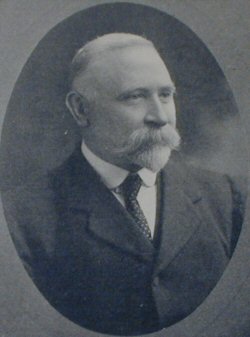 JOHN
YOUNG
JOHN
YOUNGTHE late General Manager of the Corporation Tramways is a son of the late Mr. John Young of Wester Fulwood, Renfrewshire, one of the most extensive and progressive farmers of his day. Of his five brothers, two are ministers of the United Free Church, and Mr. Young was himself intended at first for a learned profession. He received his education at Houston Free Church School and Paisley Grammar School, and was dux of both in succession. As a young man, however, he was attracted by his father's profession, and set himself to master the science and practice of farming. He was invited to take the management of large landed estates both in England and in America, but declined, intending to farm on his own account. While he was still in the twenties, however, a different career opened to him. Glasgow Corporation advertised in 1875 for a man to reorganize and manage the Cleansing Department of the city. Mr. Young was advised to apply, and was appointed unanimously. Here his abilities as an organiser and manager at once became obvious. Work that had previously been looked upon as "mere scavenging," became one of the most valuable economic departments of the city. During the depression in 1879 after the failure of the City of Glasgow Bank, Mr. Young found remunerative work for the crowds of unemployed. Fulwood Moss, near Bishopton, was leased by the city for thirty-one years, and by utilization of the city refuse, and the labour of the unemployed, was almost at once made to produce abundant and excellent crops. He afterwards secured by purchase for the city the estates of Ryding and Maryborough, and turned them to good account in the same way. He also took up the problem of city sewage, at that time making an abomination of the Clyde, and it is practically on the lines of his committee's report in 1877 that the present system has been carried out. It was under his supervision that the first part of that system, the Dalmarnock Sewage Works, came into existence.
In 1892 the Corporation resolved to take the management of the street tramways, which had been leased to a company since 1873, into its own hands. Mr. Young was asked to advise on the subject, and his report showed so comprehensive a grasp of the situation that he was appointed General Manager of the Tramway Department. Two years later, on 1st July, 1894, the day after the lease expired, and the private company withdrew its cars, Mr. Young was ready with a new establishment fully equipped, including stables, car-sheds, granaries, and 400 cars with 4,000 horses and a full staff, and started the Municipal service upon all the routes. From the first day the undertaking was a brilliant success, and at the end of the first year's operations, the Tramways Committee minuted a special vote of thanks to Mr. Young.
Very soon, however, arose the question of the traction of the future. After a visit to the Continent and America, the Manager declared for overhead electric traction. The change involved the relaying of the whole track with heavier rails, the setting up of a vast electric system, and the building of larger cars. An experiment with the Springburn route proved successful in 1898, and in 1901, at the opening of the International Exhibition in the city, electric cars were running upon all the routes. Again the enterprise proved a brilliant success, and while the fares were reduced almost to vanishing point, the revenue mounted to a princely sum. During the ten years in which Mr. Young remained General Manager, the track mileage was extended from 60 to 158 miles, the number of passengers carried increased from 55,694,676 to 188,962,610, and the revenue rose from £334,304 to £724,851.
In consequence of his success, Mr. Young's advice was much asked for by other corporations, and he rendered valuable services as Parliamentary witness to many important municipalities, such as Manchester and Liverpool, which followed Glasgow's lead. In 1902 he became first President of the Municipal Tramways Association of Great Britain, and he presided over the first two meetings of the Association at London in 1902 and Glasgow in 1903.
During his managership in Glasgow, several tempting offers were made to Mr. Young to go elsewhere. Among other positions he was offered the Chief Officership of the London County Council Tramways. But these advances were all declined. It was not till 1904, when the Municipal system in Glasgow was a complete and proved success, that he saw his way to leave the city. In September of that year he was invited by Mr. Charles T. Yerkes, the American millionaire, chairman of the Underground Electric Railways Company of London, Limited, to become his General Assistant and General Manager of the Metropolitan District Railway, and the proposition came to him "in such a way that he could not find any sufficient reason for declining it." Glasgow parted from him with great regret, and before he left he was entertained at a great public banquet presided over by the Lord Provost, Sir John Ure Primrose.
In 1880, Mr. Young married Miss Graham, only daughter of the late Mr. John Graham, accountant, Glasgow, and has a family of three sons.